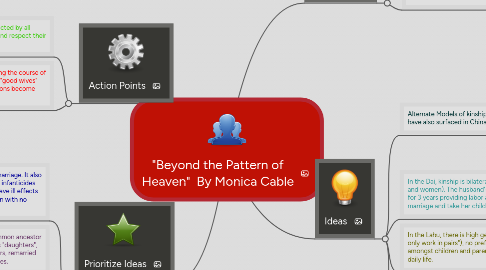"Beyond the Pattern of Heaven" By Monica Cable
por Soraia Maciel


1. Action Points
1.1. "Filial Piety" is expected by all children to honor and respect their parents.
1.2. Men strive to become "junzi" (gentlemen) during the course of their lives, while women are encouraged to be "good wives" and "mothers" by helping their husbands and sons become junzi.
2. Prioritize Ideas
2.1. Government changes after 1950 outlaws concubines and child marriage. It also puts a "one child policy" in place. This leads to an increase in female infanticides and female fetus abortions. This male prefered society is likely to have ill effects on future generations (too many males and over demanding children with no siblings).
2.2. Patrileanal kinship uses surname of Han to a common ancestor of male genealogies only. Women are only noted as "daughters", "wives" or "mothers" but not as individuals. Widowers, remarried or divorced women are NOT recorded on family trees.
2.3. Even in death a woman's fate of her soul is dependent on ancestor worship to be conducted by male descendents.
3. Problem
3.1. In China the "Han" makes up the majority (92%) of the ethic groups. This is made up of a heavily "male-centric" kinship system.
3.2. Confucianism has a heavy influence in traditional Chinese history marked by "filial piety" (the pattern of heaven). This virtue is in place to keep mankind from chaos and disorder.
4. Ideas
4.1. Alternate Models of kinship have also surfaced in China:
4.1.1. Unlike the Han where a woman must live in her husband's home and serves the purpose of bearing a male heir and serves her mother in law. She may be expelled from her husband's home if she is barren or neglects her in-laws.
4.1.2. Divorce cannot be initiated by a woman, if she leaves she may be charged with abandonment, may be beaten and sold by her husband
